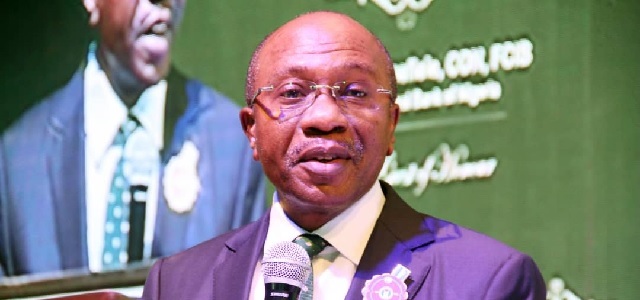In view of the huge potential $10bn that can be saved yearly from ensure the nation’s cotton industry thrives, besides its huge employment potentials, Godwin Emefiele, Governor of the Central Bank of Nigeria (CBN), on Tuesday added textile materials to the list of existing 42 items barred from accessing the official foreign exchange window henceforth.
Emefiele, who announced this during a textile industry stakeholders meeting in Abuja, warned all FX dealers in the country “to desist from granting any importer of textile material access to FX in the Nigerian Foreign exchange market.”
According to him, Nigeria with its estimated over 180 million population and a huge domestic market with potential for job creation, “currently spends above $4 billion annually on imported textiles and ready-made clothing.
“One quick example that highlights the potential of this local market, includes the need to support provision of uniforms and clothing apparels for school students, military and paramilitary officers as well as workers in the industrial sector.
“In addition, when we consider the amount spent on outfits for religious and social events such as weddings, naming and funeral ceremonies on a weekly basis, the potential market size is well over $10bn annually,” he stressed further.
The CBN governor assured that the apex bank “shall adopt a range of other strategies that will make it difficult for recalcitrant smugglers to operate banking business in Nigeria. The details of those strategies will be unfolded in due course.”
The CBN, he continued, “will initially support the importation of cotton lint for use in textile factories, with a caveat that such importers shall begin sourcing all their cotton needs locally beginning from year 2020.”
He promised that the CBN’s Anchor Borrowers Programme will support local cotton growers to enable them meet the needs of the nation’s textile industries, in addition to supporting efforts to source high yield cotton seedlings that will ensure the yields from local farmers meet global benchmarks.
He also promised financial support at single digit rate that would enable textile manufacturers “refit, retool and upgrade their factories in order to produce high quality textile materials for the local and export market.”
On the need for stable electricity, the CBN, he continued, shall support the creation textile production centers in certain designated areas in Nigeria where access to electricity shall be guaranteed.
He recalled that “in 2016, the CBN began discussions with the Kano and Kaduna State Governments to establish textile industrial areas in a bid to guarantee stable electricity in those industrial areas. We would intensify efforts with these governments and others that may show keen interest to see to the quick actualization of such programmes.
“We believe that these measures will discourage smuggling, resuscitate this critical industry, and support your efforts at creating jobs for Nigerians,” he stressed.
He recalled that between the 1970s and 80s, “Nigeria was home to Africa’s largest textile industry, with over 180 textile mills in operations, which employed close to over 450,000 people. By today, if we had nurtured and encouraged the textile industry, that sector will be employing millions. The textile industry at that time, was the largest employer of labour in Nigeria after the public sector, contributing over 25% of the workforce in the manufacturing sector.
“This industry was supported by the production of cotton by 600,000 local farmers across 30 of Nigeria’s 36 states. This sector supported the clothing needs of the Nigerian populace, as our markets were filled with locally produced textiles from companies such as United Textiles in Kaduna, Supertex Limited, Afprint, International Textile Industry (I.T.I), Texlon, Aba Textiles, Asaba Textile Mills Ltd, Enpee and Aswani Mills amongst several others.”
The past 20 years, he noted, have been very difficult for many textile firms in the face of rising operating cost and weak sales due to high energy cost, smuggling of textile goods, and poor access to finance, resulting in staff retrenchments. As if that was not enough damage to the economy, he said most of these factories have stopped operations, leaving only 25 in operation “today at below 20 percent of their production capacities, and the workforce in Nigeria’s textile industry stands at less than 20,000 people. In addition, the cotton growing sector has gone dead, thereby depriving thousands of small holder farmers the opportunity to earn a living. Furthermore, a large proportion of our clothing materials are imported from China and countries in Europe. At this stage, we intervened to redirect our focus to the important role the textile industry played in our country. They did more than produce cottons and textiles, they helped in sustaining the vitality of the neighborhoods in which they operated.
“With the death of these industries, came a rise in unemployment, insecurity and other negative social vices,” adding that the meeting is aimed at changing the narrative by addressing some of the challenges facing this key industry. This, he continued, is given the high domestic demand for textiles, we will be able to create jobs for our economy, while increasing production of textiles in Nigeria.
Trending Today
Menu







